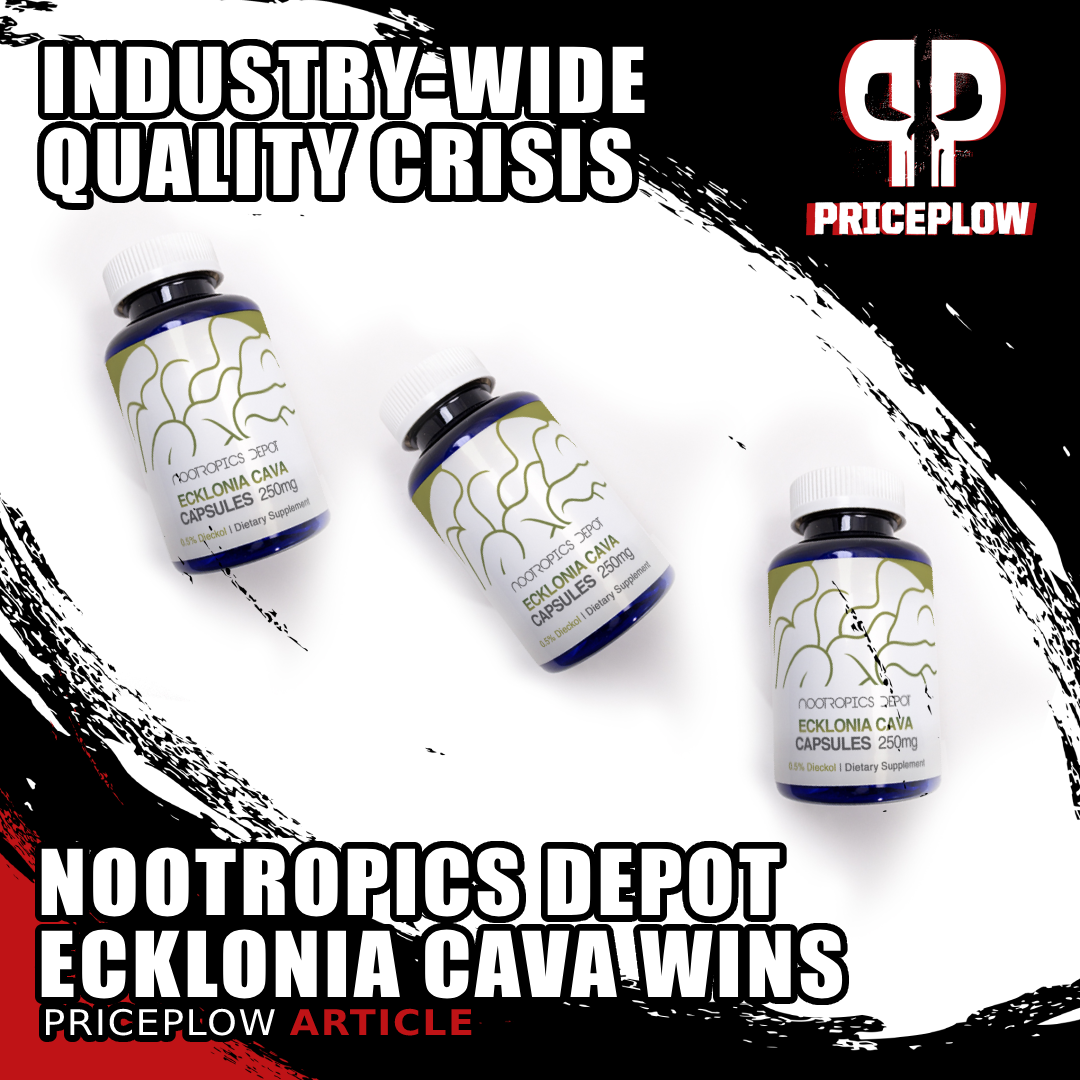
Third-party chromatography testing of 7 Ecklonia cava products reveals only Nootropics Depot Ecklonia Cava contains measurable dieckol. Every competitor tested non-detect for this critical bioactive compound.
When it comes to herbs, the supplement industry has a bit of a credibility problem. Claims of "standardized extracts" and "premium quality" appear on countless labels, yet few companies back these promises with actual testing data. When Nootropics Depot developed their Ecklonia cava supplement after a six-year development journey, they didn't just create a superior product, they exposed a market flooded with products that fail to deliver what they promise.
Third-party chromatography analysis reveals a stark reality: Nootropics Depot's Ecklonia Cava is the only product on the market with measurable dieckol content of the seven tested. Every competitor they tested showed non-detect levels of this critical bioactive compound.
This isn't speculation or marketing spin. This is what happens when you subject products to the same analytical chemistry methods used in pharmaceutical development. The chromatograms don't lie.
In this article, we explore these lab tests, and explain why Dieckol is so important. Before heading in, check PricePlow's pricing and availability and sign up for our Nootropics Depot news alerts:
Nootropics Depot Ecklonia Cava – Deals and Price Drop Alerts
Get Price Alerts
No spam, no scams.
Disclosure: PricePlow relies on pricing from stores with which we have a business relationship. We work hard to keep pricing current, but you may find a better offer.
Posts are sponsored in part by the retailers and/or brands listed on this page.
This area is reserved for Team PricePlow's upcoming Research Study video.
Subscribe to our channel and sign up for notifications so you catch it when it goes live!
What is Dieckol and Why Does It Matter?
Before diving into the testing results, we need to understand what we're measuring and why it matters. Dieckol is the primary bioactive phlorotannin in Ecklonia cava responsible for the seaweed's impressive health benefits.
The Key to Ecklonia Cava’s Benefits
Research has identified dieckol as the compound driving many of Ecklonia cava's documented effects:[1-6]
- Metabolic support: Activates AMPK pathways to enhance fat oxidation while reducing fat synthesis
- Glucose regulation: Multiple human clinical trials show improved postprandial glucose responses
- Sleep quality: Acts as a positive allosteric modulator of GABA receptors, enhancing non-REM sleep without suppressing delta wave activity
- Neuroprotection: Protects against amyloid-beta neurotoxicity while supporting BDNF production
- Antioxidant power: Marine-derived phlorotannins demonstrate 10-100 times greater potency than terrestrial polyphenols
The comprehensive research on Ecklonia cava spans metabolism, cognition, liver health, and even hair growth. But all of these benefits depend on one critical factor: actually having dieckol in your supplement!
Why Standardization to Dieckol is Essential
Generic "Ecklonia cava" claims mean nothing without standardization. Raw seaweed material can vary wildly in phlorotannin content depending on harvest location, processing methods, and even the species of brown algae used.[5] Without verified dieckol content, you're gambling on whether your supplement contains any meaningful bioactive compounds at all.
This is where analytical chemistry becomes crucial. You can't fake a chromatogram.
Understanding Chromatography: The Gold Standard for Verification
High-Performance Liquid Chromatography (HPLC) serves as the pharmaceutical industry's gold standard for identifying and quantifying compounds in complex mixtures. The technique separates different molecules based on their chemical properties, creating a unique "fingerprint" for each substance.
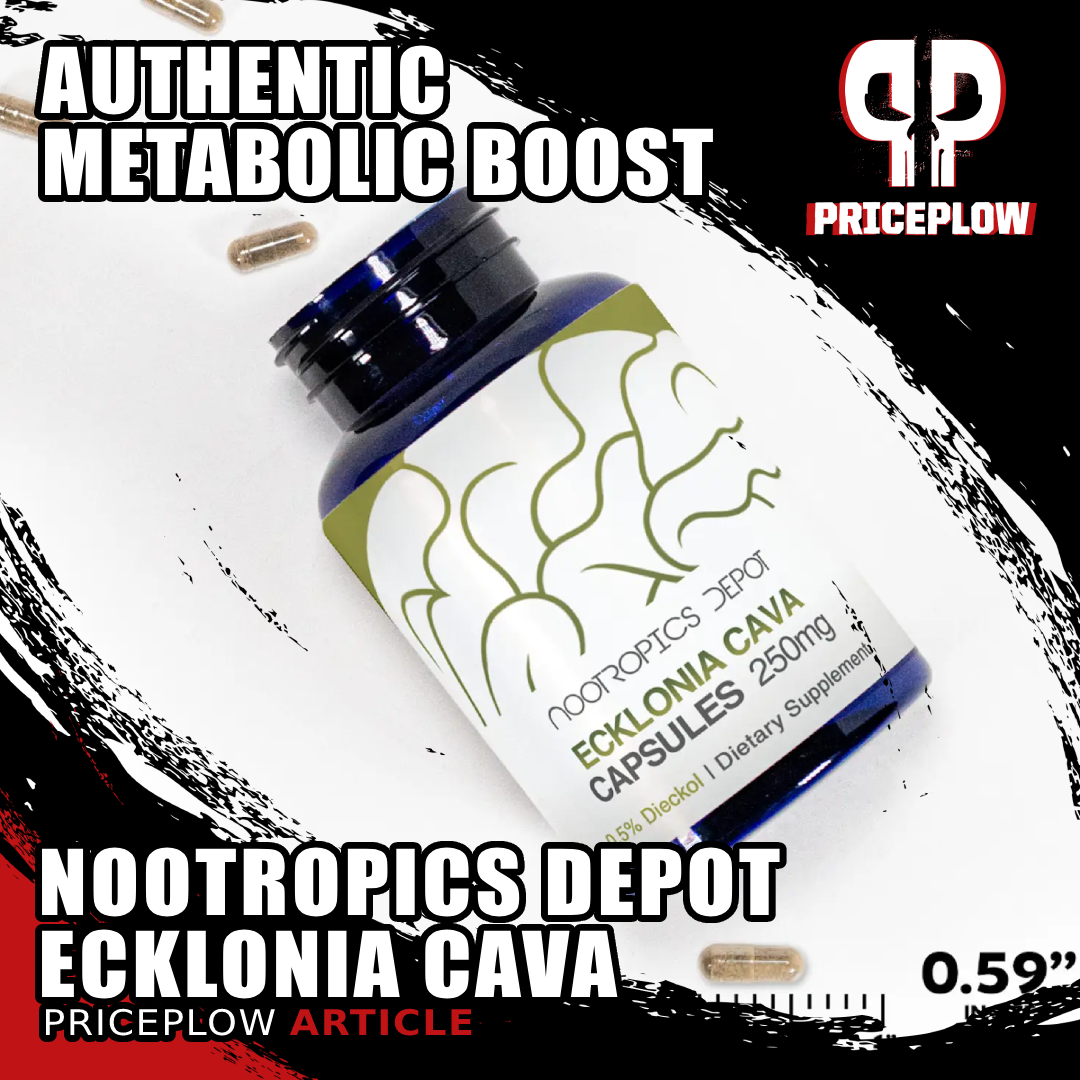
Nootropics Depot spent 6 YEARS developing their Ecklonia Cava supplement, discovering most market products aren't genuine! Their authentic marine extract offers metabolic, cognitive and sleep benefits backed by real science. The only verified Ecklonia Cava you can trust.
How to Read a Chromatogram
Each peak on a chromatogram represents a different compound. The position (retention time) tells you what the compound is, while the peak height indicates how much is present. When testing Ecklonia cava products for dieckol:
- Run a dieckol standard (pure dieckol) to establish the reference retention time
- Test each product under identical conditions
- Compare the product chromatograms to the standard
- A matching peak at the same retention time confirms dieckol presence
- Peak height/area allows for quantification
This methodology leaves no room for ambiguity. Either a product contains dieckol or it doesn't.
The Dieckol Standard: Setting the Benchmark
Nootropics Depot's testing began with a pure dieckol standard, which produced a clean, sharp peak at approximately 5.1 minutes retention time. This single, well-defined peak serves as the reference point for all subsequent testing.
When a genuine Ecklonia cava product is analyzed, it should show a prominent peak at this same retention time, along with additional peaks from other phlorotannins naturally present in the seaweed. The pattern is distinctive and reproducible.
The Investigation Results: A Market-Wide Quality Crisis
When Nootropics Depot subjected commercially available Ecklonia cava products to HPLC analysis, the results were shocking. Of seven products tested from major retailers and supplement brands, only one contained measurable dieckol.
The Bar Chart That Says Everything
The quantitative analysis speaks for itself:
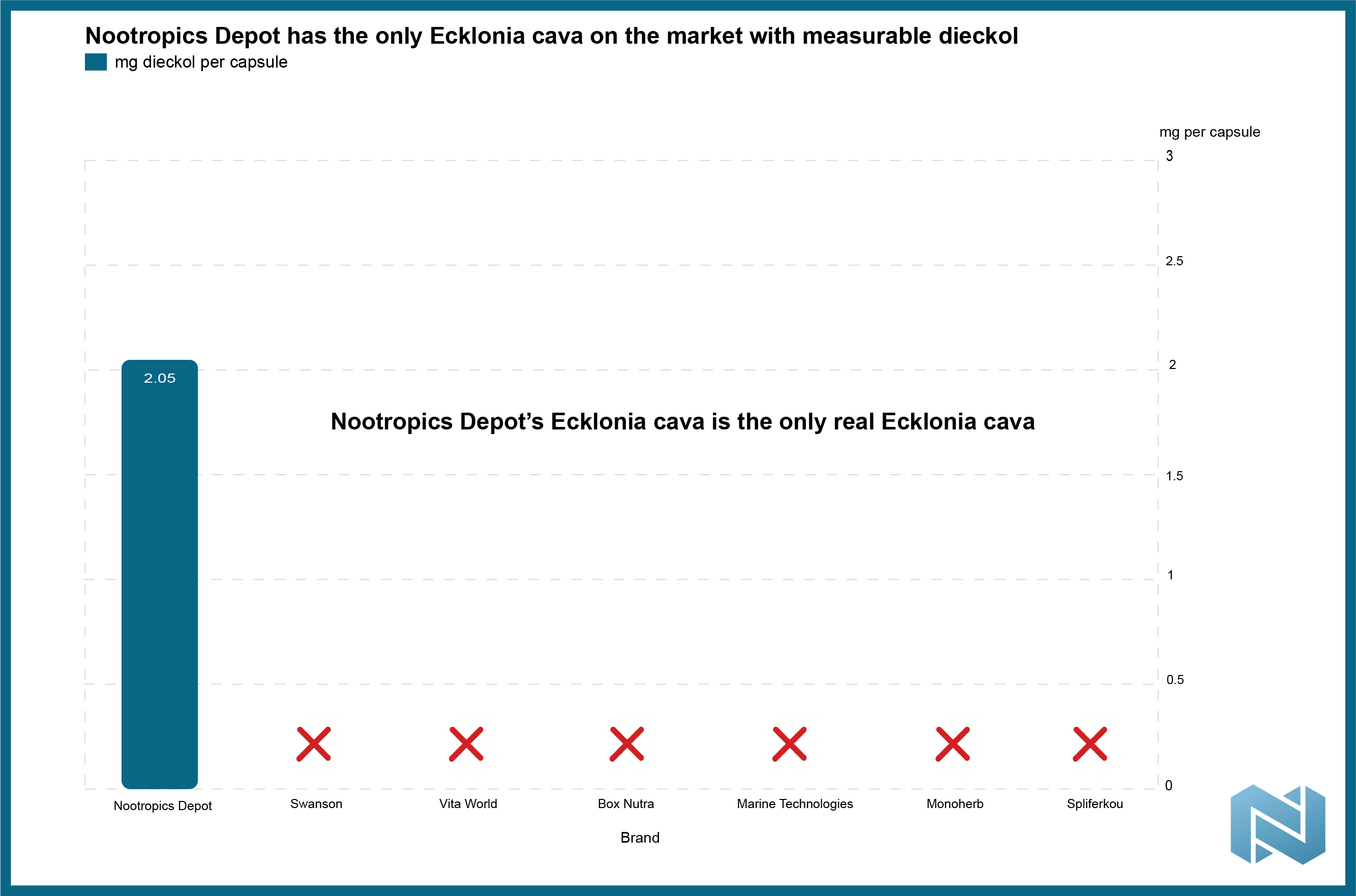
Quantitative testing reveals Nootropics Depot delivers 2.05mg of dieckol per capsule while all six competing brands tested show zero detectable dieckol content.
- Nootropics Depot: 2.05mg dieckol per capsule
- All other brands tested: Non-detect (marked with red X)
This isn't a minor difference in potency. This is the difference between a product that contains the researched bioactive compound and products that don't.
Brand-by-Brand Chromatogram Analysis
The visual evidence from HPLC chromatograms confirms what the quantitative data shows. When overlaid with the dieckol standard, the differences become impossible to ignore.
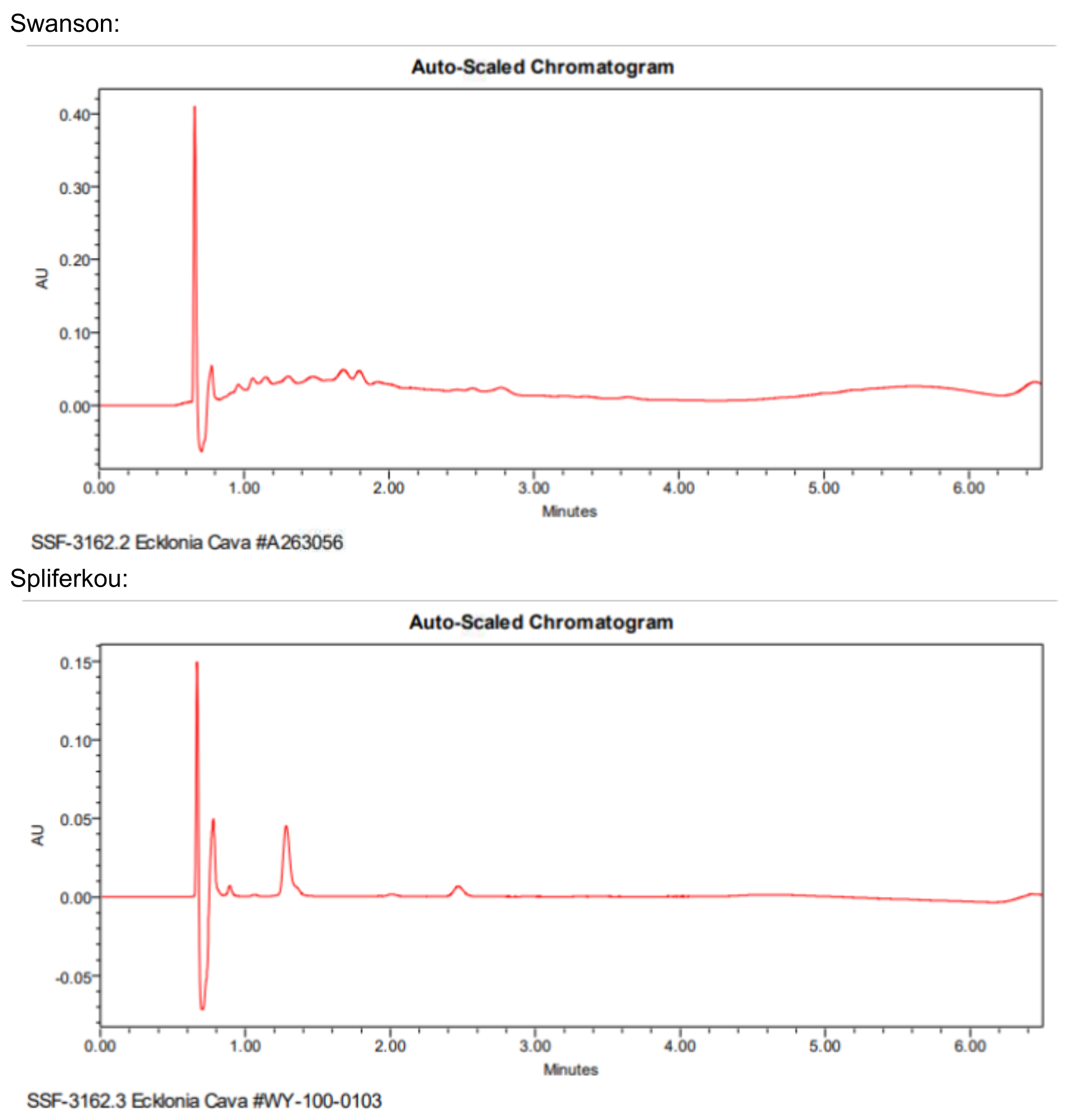
HPLC analysis of Swanson and Spliferkou products reveals only early-eluting peaks with no signal at the 5.1-minute retention time where dieckol should appear.
Products Showing Non-Detect for Dieckol
Six of the seven products tested showed no visible dieckol peak at the reference retention time:
- Early-eluting peaks only: Several products showed minor peaks in the 0.5-1.5 minute range, indicating low-molecular-weight compounds unrelated to dieckol
- Flat baselines: Some chromatograms were nearly featureless, suggesting minimal phlorotannin content of any kind
- Wrong retention times: A few products showed late-eluting peaks, but at positions inconsistent with dieckol's retention time
These patterns indicate either adulteration with incorrect seaweed species, use of low-quality material with degraded phlorotannins, or processing methods that destroy bioactive compounds.
The One Exception: Nootropics Depot
The Nootropics Depot chromatogram stands in stark contrast. It shows:
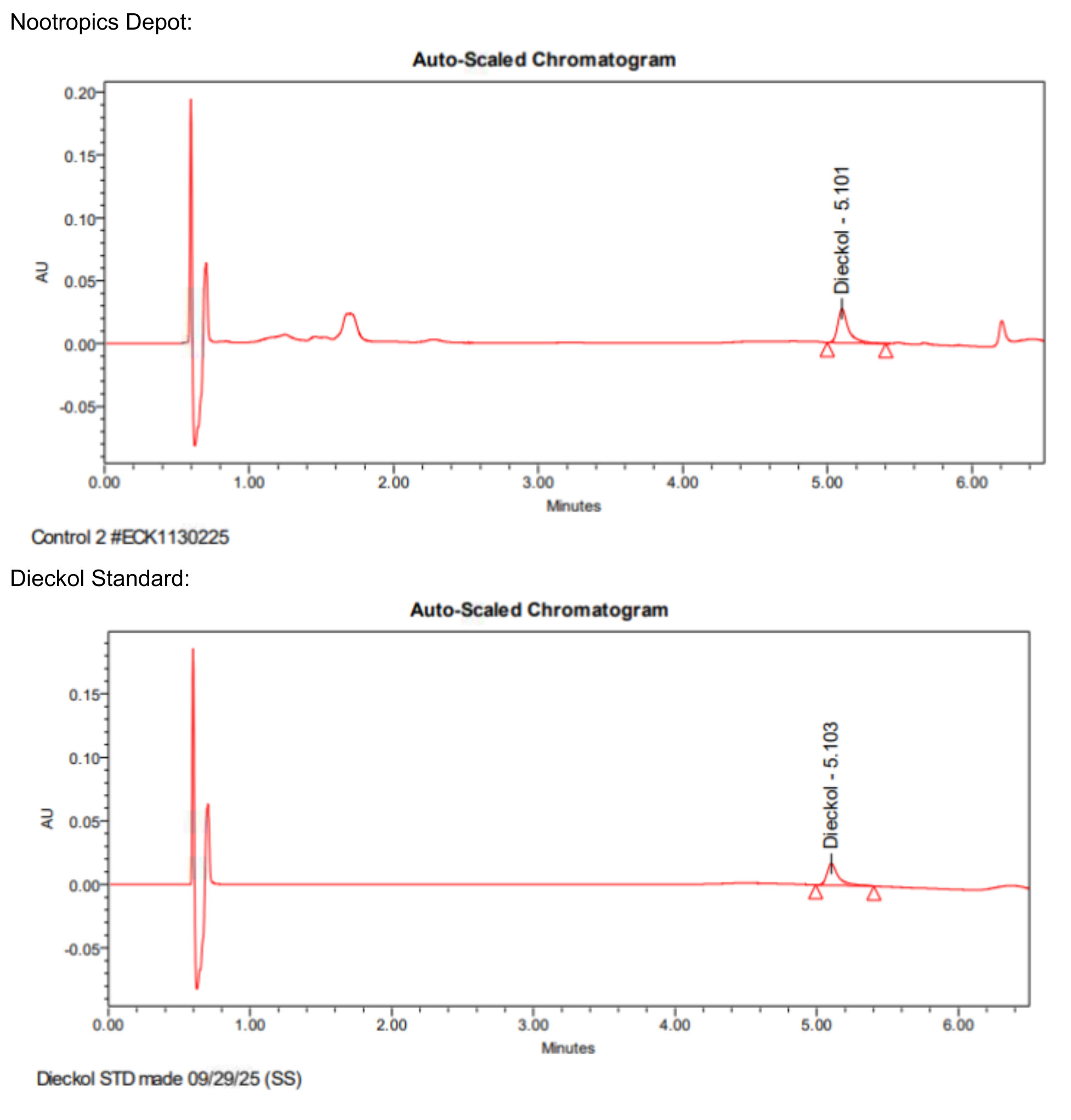
Nootropics Depot's chromatogram displays a distinct dieckol peak at 5.101 minutes, matching the pure dieckol standard's retention time of 5.103 minutes.
- Clear dieckol peak: A prominent, sharp peak at 5.1 minutes, perfectly matching the dieckol standard
- Supporting phlorotannin profile: Additional smaller peaks flanking the main signal, consistent with a full-spectrum extract
- Clean baseline: Minimal interference from non-target compounds
This is what authentic, properly processed Ecklonia cava looks like under analytical scrutiny.
Why This Industry Problem Matters
The implications extend far beyond disappointed consumers who wasted money on ineffective products.
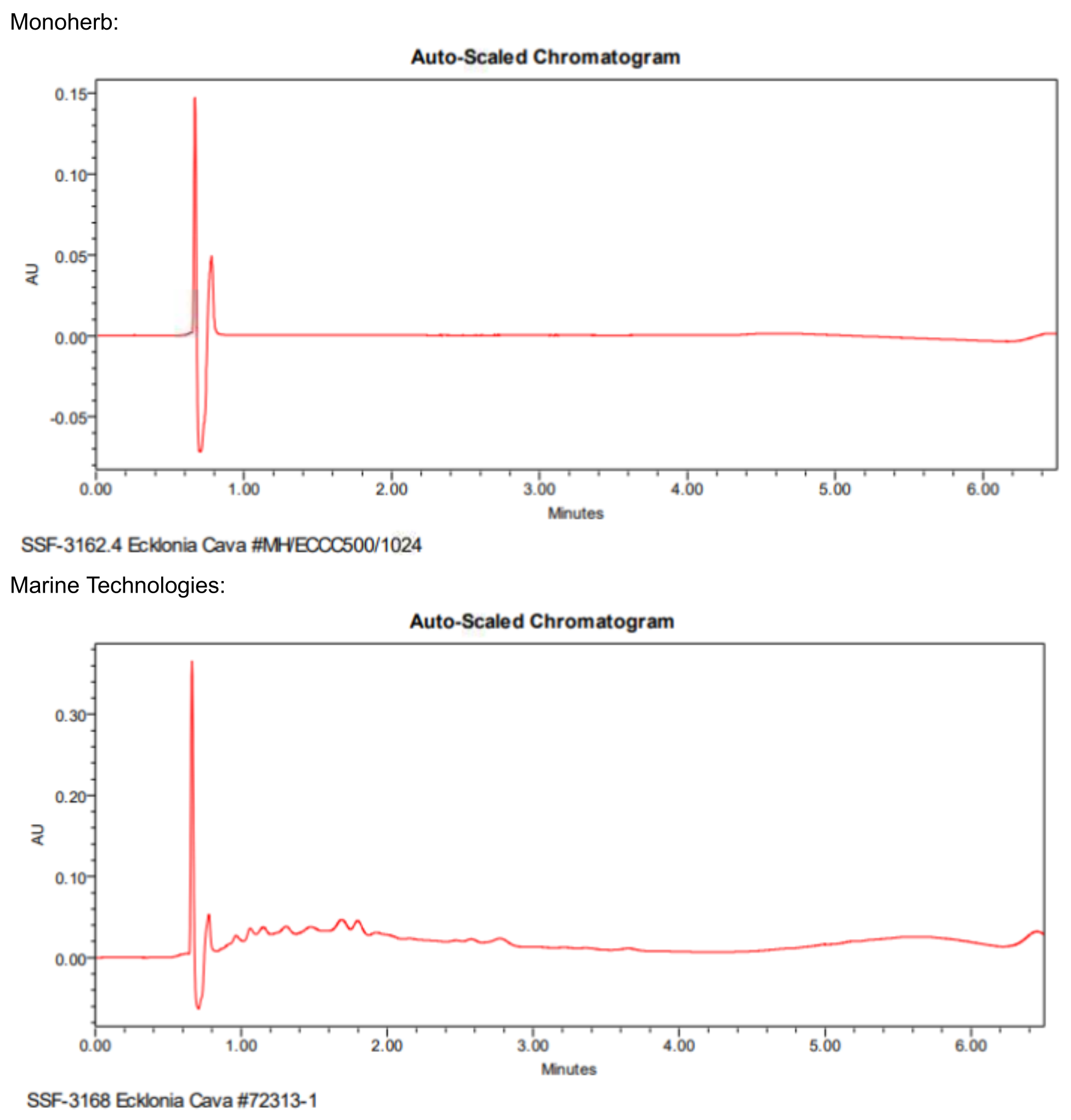
Both Monoherb and Marine Technologies samples demonstrate minimal phlorotannin activity with no detectable dieckol peak when tested via HPLC.
Consumers Concluding “Ecklonia Cava Doesn’t Work”
When people purchase products labeled as Ecklonia cava, take them as directed, and experience no benefits, they understandably conclude the ingredient doesn't work. In reality, they never consumed authentic Ecklonia cava at all.
This creates a negative feedback loop where legitimate research on Ecklonia cava's benefits gets dismissed because consumers' experiences don't match clinical findings. The ingredient develops an undeserved reputation as another overhyped supplement, when the real problem is product quality.
The Cost of Fake Products
At typical market pricing, consumers spend $20-40 per month on Ecklonia cava supplements. Across thousands of users, this represents millions of dollars flowing to products that fail to deliver. The financial impact isn't trivial, especially for health-conscious consumers already stretching supplement budgets.
Beyond wasted money, there's an opportunity cost. People taking ineffective products miss out on legitimate interventions that could improve their metabolic health, sleep quality, or cognitive function.
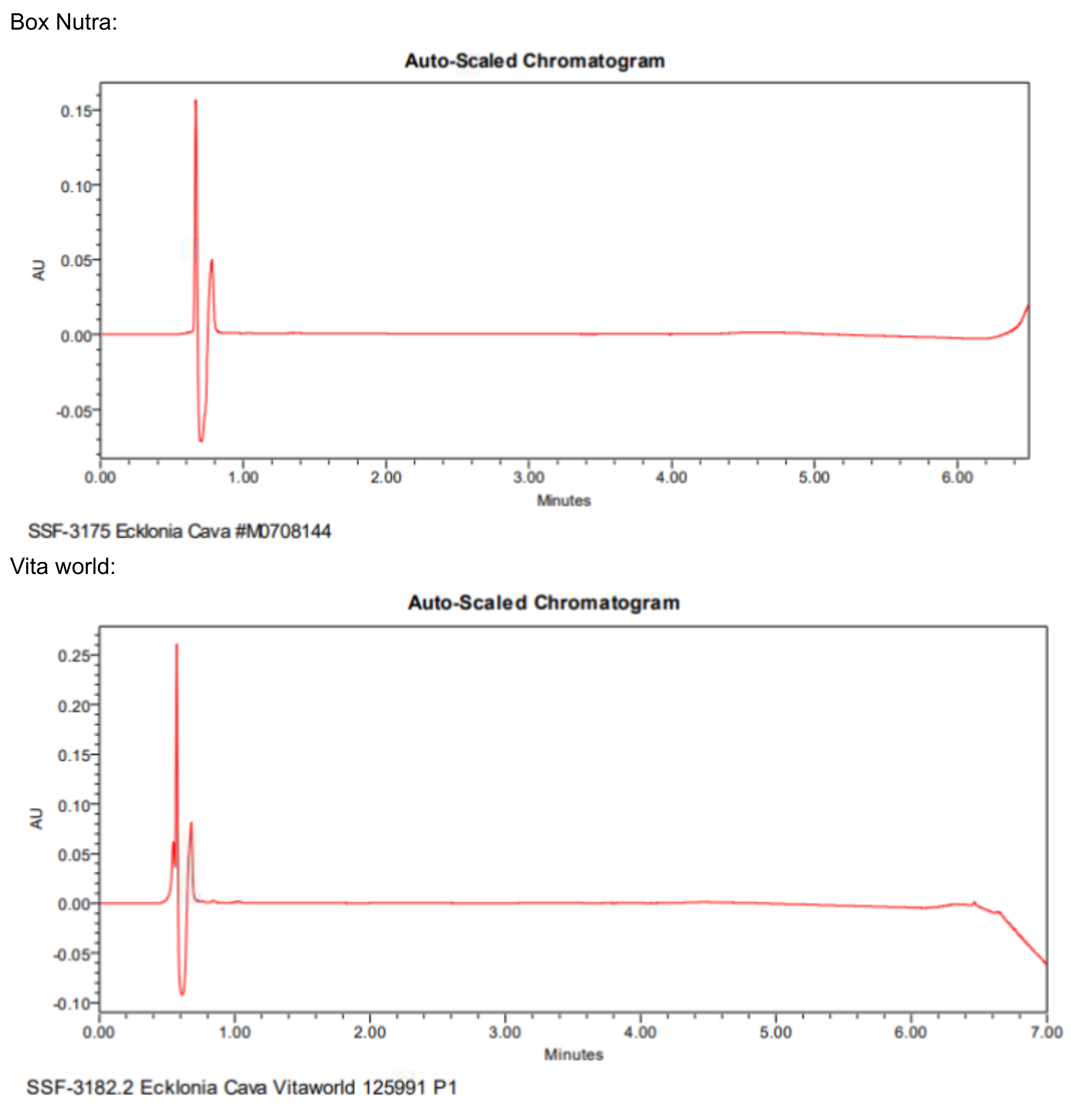
Laboratory testing of Box Nutra and Vita World products shows early compound activity but fails to detect dieckol at the expected retention time.
Broader Trust Issues in Supplements
The Ecklonia cava situation isn't unique. Similar quality problems plague Tongkat ali (where Nootropics Depot's testing found most products contain little to no eurycomanone), Lion's Mane mushroom (where meaningful erinacine A content is rare), and countless other ingredients.
Each exposed quality crisis chips away at consumer trust in the entire supplement industry. When companies can sell mislabeled products with impunity, honest brands that invest in quality face an uphill battle convincing consumers their higher prices reflect actual value.
How Nootropics Depot Solved the Problem
The six-year development story of Nootropics Depot's Ecklonia cava reveals why quality products are so rare.
Creating the First Reference Standard
When Nootropics Depot first explored bringing Ecklonia cava to market, they discovered a fundamental problem: no botanical reference materials (BRMs) existed for this seaweed. Without a verified standard, they couldn't confidently test supplier materials or finished products.
Rather than proceeding with unverified material like most companies, Nootropics Depot partnered with a Korean university, specialized DNA labs, and experienced botanists to create the first validated Ecklonia cava reference material. This unprecedented step established the foundation for all subsequent quality control.
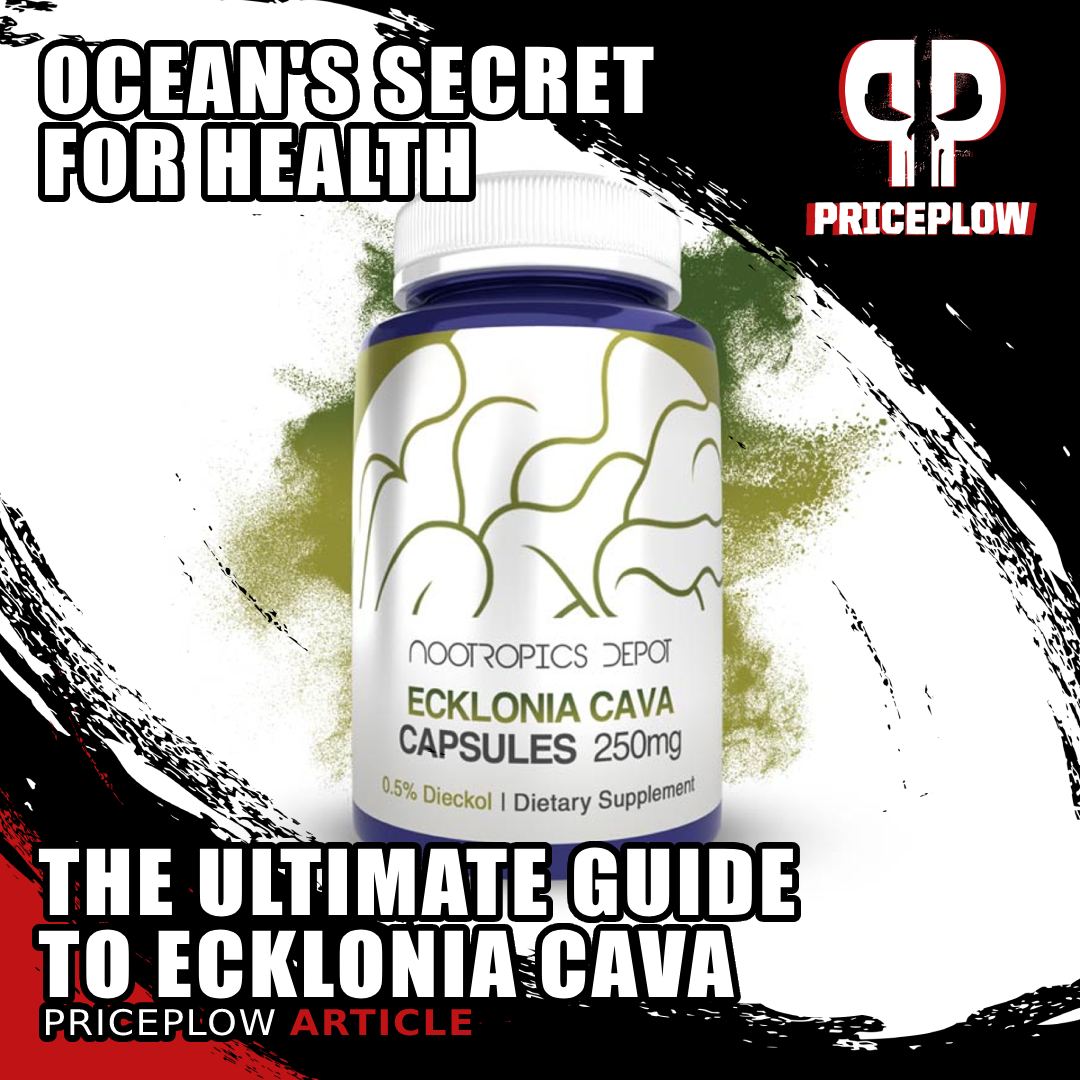
Brown seaweed Ecklonia cava outperforms land-based plants with its powerful phlorotannins! Research shows benefits for metabolism, cognition, liver health, and even hair growth.
Discovering the Market Reality
With proper testing capability in hand, Nootropics Depot analyzed commercially available Ecklonia cava products. The results confirmed their worst fears:
- None of the market samples passed identity verification
- Even major US brands selling "Ecklonia cava" failed DNA testing
- Products contained completely different seaweed species
This discovery explains why the chromatography results show non-detect dieckol across all tested competitors. They're not selling degraded Ecklonia cava, they're selling the wrong species entirely.
Building a Korean Supply Chain from Scratch
Finding genuine Ecklonia cava proved nearly impossible through standard channels. The seaweed is a protected species under Korean government regulations, with direct ocean harvesting prohibited. The only fully legal source is material that washes ashore after cyclones hit coastal islands.
These constraints forced Nootropics Depot to:
- Establish a facility in Korea
- Build relationships with multiple local suppliers
- Create a logistics network to aggregate sufficient supply
Optimizing for Natural Dieckol Content
Beyond securing authentic material, Nootropics Depot conducted deeper analytical work to identify the highest-quality sources. Their research revealed that Ecklonia cava from specific parts of Jeju Island contains significantly higher dieckol content due to environmental factors like sunlight exposure, tidal patterns, and water mineral composition.
This knowledge allowed them to source material with naturally elevated dieckol levels rather than relying on chemical extraction processes that might alter the full phlorotannin spectrum.
The result: a supplement standardized to 0.5% dieckol minimum (their current batch tests at 0.82%, exceeding specifications by 64%), achieved through careful source selection rather than harsh processing.
What Quality Ecklonia Cava Looks Like
For consumers navigating the supplement marketplace, certain quality markers separate legitimate products from the questionable majority.
Dieckol Standardization with Published Results
Look for products that specify actual dieckol percentages rather than vague "Ecklonia cava extract" claims. More importantly, verify that the company publishes batch-specific test results showing dieckol content confirmed by HPLC or UPLC analysis.
Nootropics Depot provides Certificate of Analysis (COA) documentation showing:
- Identity confirmation via High-Performance Thin-Layer Chromatography (HPTLC)
- Dieckol quantification through Ultra-Performance Liquid Chromatography (UPLC)
- Heavy metals screening including speciated arsenic
- Microbial testing
- Water activity and moisture content analysis
This multi-layered approach ensures each batch meets specifications for identity, potency, purity, and stability.
Source Verification and Traceability
Legitimate Ecklonia cava requires documented sourcing from Korean coastal regions where authentic material is harvested. Companies should be able to answer:
- Where specifically was the seaweed collected?
- How is authenticity verified?
- What extraction methods were used?
- How is dieckol content optimized?
Vague answers or an inability to provide sourcing details should raise red flags.
Third-Party Testing by ISO-Accredited Labs
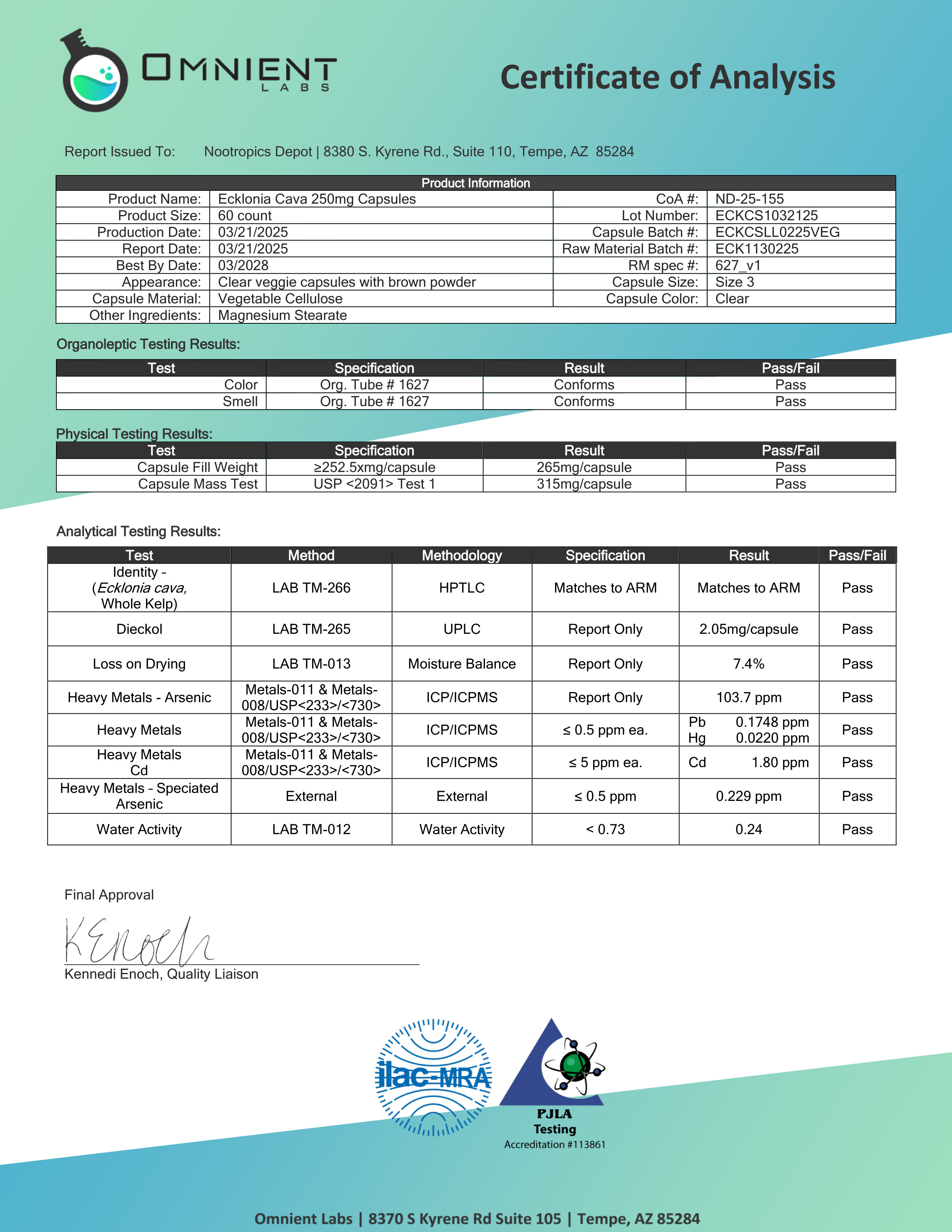
Nootropics Depot's third-party lab testing shows that their supplement goes above and beyond their guaranteed dieckol content
Look for products tested by ISO-accredited laboratories using validated analytical methods. Published COAs should include:
- Laboratory name and accreditation details
- Specific test methods used (HPLC, UPLC, etc.)
- Quantitative results for key compounds
- Pass/fail status for safety parameters
- Batch/lot numbers for traceability
Transparency as a Quality Signal
Companies confident in their products have nothing to hide. They publish detailed testing results, provide sourcing information, and welcome questions about their quality control processes. This stands in stark contrast to brands that hide behind proprietary blends, vague extract ratios, or an absence of published test data.
Nootropics Depot's willingness to conduct comparative testing and publish results (even when those results expose industry-wide problems) reflects a commitment to transparency that should be the industry standard.
Conclusion: Choose Products That Pass the Test
The chromatography data makes the choice clear. When purchasing Ecklonia cava supplements, you face a binary decision: products with verified dieckol content or products that fail analytical testing.
This isn't about brand loyalty or marketing preferences. It's about whether you're actually consuming the compound that clinical research shows delivers results. The HPLC chromatograms remove all ambiguity.
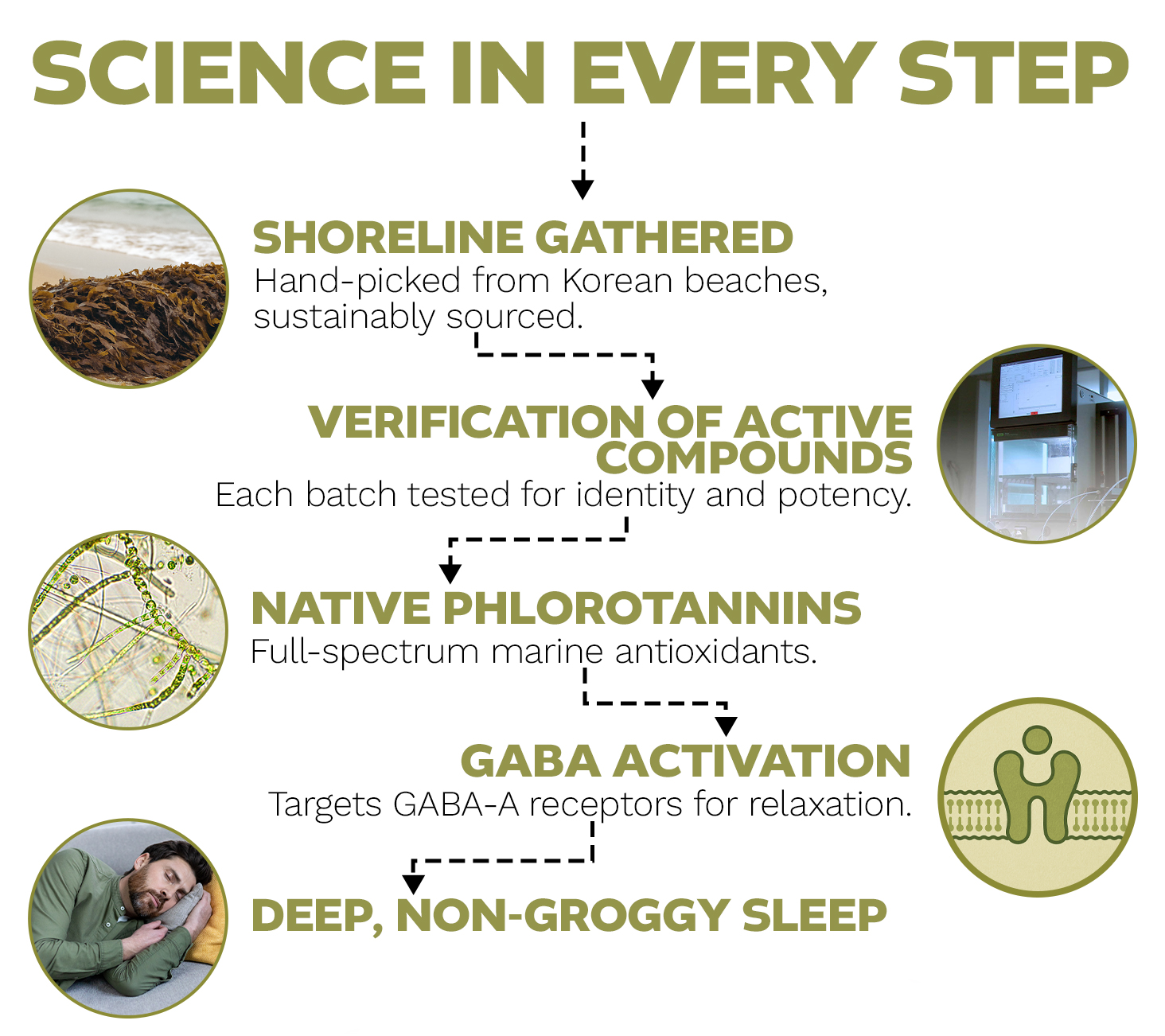
From Korean shoreline harvesting through HPLC verification to GABA receptor activation, each step in the production chain ensures authentic dieckol content and documented sleep benefits.
The Data Speaks for Itself
- One product tested at 2.05mg dieckol per capsule
- Six products showed non-detect for dieckol
- The difference isn't subtle or debatable
- Chromatography doesn't lie
What This Means for Consumers
If you're considering Ecklonia cava for its researched benefits on metabolism, cognition, sleep, or overall health, product selection matters tremendously. The investment in quality pays off not just in efficacy but in avoiding wasted money on products that fail basic authenticity testing.
A Model for Industry Transparency
Nootropics Depot's approach to Ecklonia cava -- creating reference standards, building authentic supply chains, conducting comparative testing, and publishing results -- sets a precedent that other companies should follow. Similar investigations into Tongkat ali, saffron, and other ingredients demonstrate that quality problems extend across multiple supplement categories.
Consumers benefit when companies compete on actual quality rather than marketing claims. Analytical chemistry provides the tools to separate fact from fiction. The only question is whether brands are willing to submit their products to scrutiny.
For Ecklonia cava, the testing has been done and the results are now very clear.
Nootropics Depot Ecklonia Cava – Deals and Price Drop Alerts
Get Price Alerts
No spam, no scams.
Disclosure: PricePlow relies on pricing from stores with which we have a business relationship. We work hard to keep pricing current, but you may find a better offer.
Posts are sponsored in part by the retailers and/or brands listed on this page.
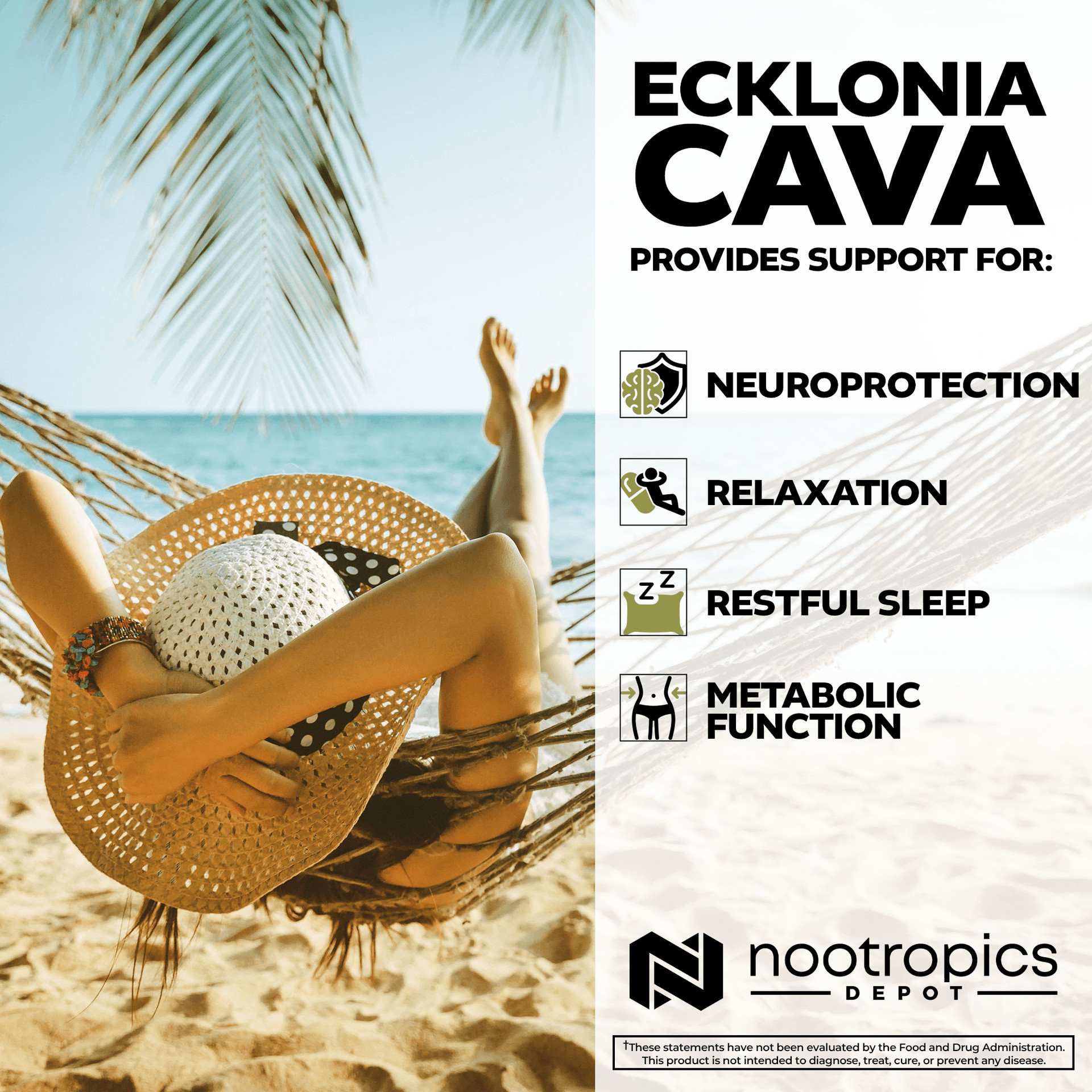
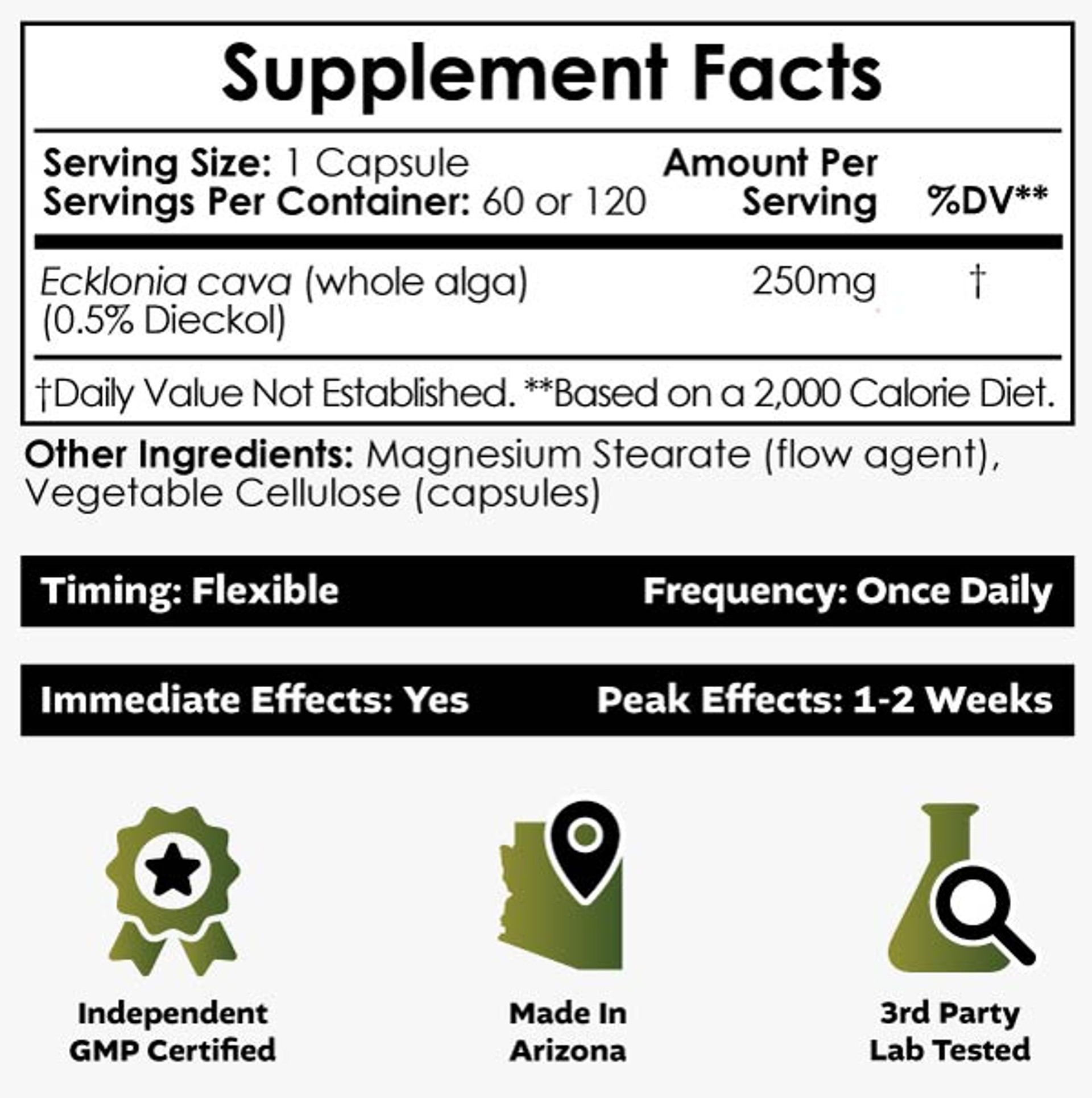



Comments and Discussion (Powered by the PricePlow Forum)